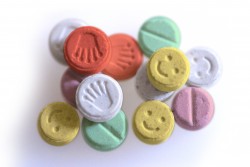Ecstasy Addiction
Overview, Signs, Symptoms & Treatment

Ecstasy often comes in a pressed pill form, and it’s hard to verify whether or not it contains other substances.
According to CESAR, MDMA or methylenedioxymethamphetamine “is the chemical found in the synthetic ‘club drug’ ecstasy, a drug with stimulant and hallucinogenic effects.” It can also be known as E, ADAM, candy canes, X, or molly. Most of the time, ecstasy tablets contain other drugs as well, but the drug itself is habit-forming and can cause addictive behavior in individuals who abuse it chronically.
Ecstasy addiction can also cause many other physical and mental issues for users as well as problems for their loved ones. When someone become addicted to ecstasy, there are signs and symptoms that can help point to the problem, and ecstasy addicts should attend treatment in order to achieve a more stable recovery.
Overview
As stated by the NIDA, “According to the 2004 National Survey on Drug Use and Health, more than 11 million people have tried MDMA at least once.” Although using the drug once has dangers of its own (heat exhaustion, dehydration, coma, death), people who become addicted to ecstasy are those who abuse it over a long period of time.
There is still some debate about whether or not ecstasy causes addiction, but many individuals who have abused the drug for long periods of time attest to having experienced withdrawal symptoms, tolerance for the drug’s effects, physical and psychological dependence on ecstasy, and a desire to continue abusing the drug, despite the harmful effects it has on them. These are all strong signs of addiction, and long-term ecstasy abusers experience these and more as the signs and symptoms of ecstasy addiction.
Ecstasy Addiction Signs
Acute ecstasy abuse can cause problems such as heat exhaustion and dehydration which, if left unchecked and in a place like a club with its own heat-causing issues, can become deadly. There are other signs a person will exhibit as a result of ecstasy intoxication, but with an addiction to the drug, they will be constant. These are:
- Nausea
- Involuntary jaw clenching
- Nystagmus (rapid pupil movement)
- Paranoia
- Anxiety
- Muscle tension
- Dry mouth
Someone who is feeling the effects of ecstasy will experience euphoria, empathy for the feelings of others, anxiety, and other strong emotional responses. However, over time, the effects of ecstasy can cause intense signs that a person may be addicted to the drug. If you notice these signs in a loved one, there is a possibility that their ecstasy abuse has turned into an addiction:
- Depression
- Insomnia
- Memory problems
- Constant confusion
- Severe anxiety
- Constant paranoia
The signs of ecstasy addiction also include an increase in risky behavior (especially sexual behavior). This can lead to the individual getting HIV, hepatitis B or C, or another disease that could be transmitted through the kind of risky sexual behavior that is common in long-term ecstasy abusers. The person may also be extremely secretive about their drug use and attempt to hide any use of ecstasy from others as they may realize that it is dangerous for them and will still not want to stop.
Ecstasy Addiction Symptoms
If you are an ecstasy user, you should understand the potential for addiction and the symptoms that you should be aware of. For example, someone who is addicted to ecstasy will experience:
- Withdrawal symptoms
- As a result of physical and psychological dependence which occurs among long-term drug abusers, withdrawal symptoms result if the individual attempts to stop using the drug completely. The withdrawal effects caused by ecstasy, according to the NIDA, are most commonly experienced as “fatigue, loss of appetite, depressed feelings, and trouble concentrating.”
- If you have been an ecstasy user in the long term and you suddenly decide to go without the drug, experiencing these issues points to addiction and you should consider treatment in order to help curb them somewhat.
- Tolerance
- Ecstasy users often experience an extreme high the first time they abuse the drug and, like in most situations of drug use, attempt to experience those same effects every time they use the drug afterward. In some cases, ecstasy users come to a point where they cannot feel the same effects that they once did when taking the drug. This leads them to abusing more ecstasy just to feel the original effects.
- This is called tolerance, and when it occurs with recreational drug use, it is a symptom of addiction. If you now use a much stronger amount of the drug than you used to when taking ecstasy, you are likely becoming addicted to the drug.
- An inability to stop
- People who become addicted to a substance may create reasons to keep abusing it. They may also hide their abuse of the drug from others or become secretive. Some individuals may decide that they want to stop abusing the drug but feel like they are unable to do so on their own.
- An inability to stop abusing ecstasy, even if you really want to, is a symptom of addiction. Ecstasy use can cause problems in your school and professional life as well as your home life and relationships, and feeling powerless or unwilling to stop in the face of these problems reveals your addiction to the drug.
Pay attention to yourself and ask yourself whether or not you may be addicted to ecstasy. The drug can be extremely intense, and those who abuse it regularly may experience the symptoms of addiction.